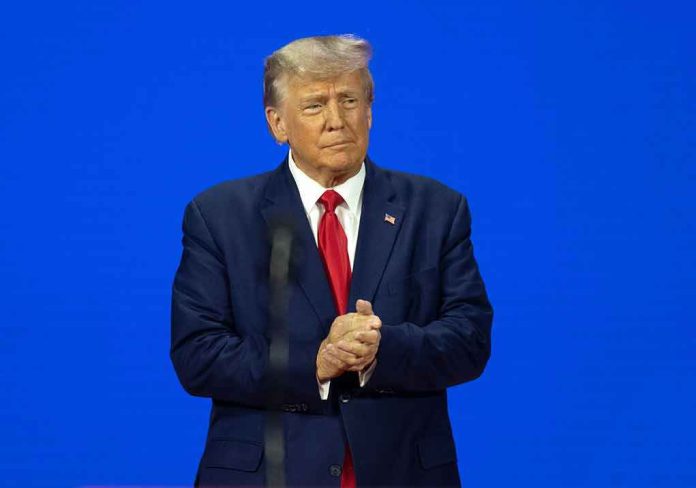
Trump’s new selective antitrust approach challenges the failed legacy of aggressive regulation, offering hope for innovation and economic growth while exposing the absurdity of past leftist overreach.
Key Points
- The Trump administration is shifting antitrust enforcement away from blanket crackdowns, focusing instead on real threats to competition.
- Tech industry chaos and rapid innovation have made previous regulatory frameworks outdated and counterproductive.
- Global regulators are recalibrating merger policies, with the US leading selective, pro-growth enforcement.
- Experts warn that aggressive antitrust enforcement can harm innovation and consumer choice.
Trump Administration’s Shift from Aggressive Antitrust Enforcement
The Trump administration has decisively moved away from the Biden-era model of sweeping antitrust crackdowns, instead prioritizing selective enforcement that targets horizontal mergers and genuine threats to competition. This approach recognizes that the tech sector’s lightning-fast innovation cycles and unpredictable market shifts have rendered one-size-fits-all regulation obsolete. By narrowing enforcement to practices that truly undermine competition, the administration aims to protect American consumers and businesses from regulatory excess that stifles growth.
Under Biden, regulators pursued expansive guidelines and investigations that failed to keep up with the pace of technological change. The Trump administration’s recalibration comes as global regulators—especially in the UK and EU—adopt more flexible, pro-growth merger policies. This shift reflects a growing recognition, both domestically and internationally, that aggressive antitrust action can disrupt innovation cycles and business planning, ultimately harming the economy and consumer welfare.
Tech Industry’s Speed Defies Traditional Regulatory Tools
The tech sector’s rapid evolution, driven by artificial intelligence, cloud computing, and platform business models, has consistently outpaced regulatory bodies. Traditional antitrust frameworks, designed for the slower-moving industrial era, struggle to address competition concerns in a landscape dominated by data complexity and network effects. This mismatch has led to high-profile enforcement setbacks—such as failed challenges to major tech mergers—and ongoing litigation that drains resources and creates uncertainty for startups and established firms alike.
Experts from leading law firms and academic institutions argue that the complexity of modern tech markets requires smarter, modernized regulatory approaches. The Trump administration’s focus on targeted enforcement is seen by many as a necessary correction, ensuring that regulatory energies are directed at genuine monopolistic abuses rather than punishing success or innovation. This nuanced strategy aligns with conservative principles of limited government intervention, protecting individual liberty and economic opportunity.
Global Regulatory Trends and Industry Implications
International regulators are responding to the US shift by reevaluating their own antitrust strategies. The UK Competition and Markets Authority (CMA) has embraced more flexible enforcement, while the European Court of Justice (ECJ) is pursuing interoperability and structural remedies instead of blanket punitive measures. These changes reflect growing concerns about regulatory fragmentation, inconsistent global standards, and the risk of stifling innovation through overreach.
For American tech companies, especially new challengers and innovators, the Trump administration’s selective enforcement creates a more predictable environment for mergers and growth. Consumers benefit from increased choice and competition, while developers and smaller platforms gain fairer access to app stores and data. The broader industry stands to gain from legal standards that evolve with technology, rather than lag behind it.
The tech industry is simply too chaotic and fast-moving to permit aggressive antitrust action. https://t.co/8ZlzyAApCw
— National Review (@NRO) September 4, 2025
Despite these positive trends, some critics continue to advocate for aggressive oversight and expanded regulatory powers. However, the prevailing expert consensus—supported by research from Yale and industry analysts—warns that such approaches risk unintended consequences, including reduced innovation and consumer harm. The Trump administration’s strategy offers a compelling alternative, grounded in common sense and a commitment to protecting American prosperity.
Expert Perspectives on Antitrust Modernization
Industry analysts and academic experts widely agree that traditional antitrust tools are ill-suited for the modern tech landscape. Calls for modernized legal standards and specialized regulatory bodies for digital markets are growing, but there is broad caution against regulatory overreach. Many point to ongoing litigation, such as the DOJ’s cases against Google and the failed FTC challenges to Meta’s acquisitions, as evidence that aggressive enforcement is both impractical and potentially harmful.
Yale researchers question whether stricter antitrust rules would have prevented the rise of tech giants like Amazon, while experts in digital law stress the difficulty of managing complex data and predicting future competition. The Trump administration’s approach is seen as a pragmatic response, balancing the need for competition with the imperatives of innovation and economic growth. This aligns closely with conservative values, affirming the importance of individual liberty, family prosperity, and a strong constitutional foundation.
Sources:
Insights Technology: Antitrust and Competition Technology – Goodwin Law
Big Tech 2025 Preview – Capstone DC
Emerging Trends in Antitrust – Lighthouse Global
Advance to Go: How Big Tech Evades Antitrust Law – Fulr.org
Would Stricter Antitrust Rules Have Stopped the Rise of Amazon? – Yale SOM





